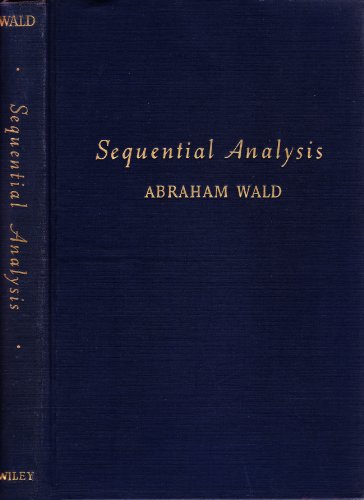Sequential Analysis by Abraham Wald (38 results)
FeedbackSearch filters
Product Type
- All Product Types
- Books (38)
- Magazines & Periodicals (No further results match this refinement)
- Comics (No further results match this refinement)
- Sheet Music (No further results match this refinement)
- Art, Prints & Posters (No further results match this refinement)
- Photographs (No further results match this refinement)
- Maps (No further results match this refinement)
- Manuscripts & Paper Collectibles (No further results match this refinement)
Condition Learn more
Binding
Collectible Attributes
- First Edition (9)
- Signed (No further results match this refinement)
- Dust Jacket (4)
- Seller-Supplied Images (10)
- Not Print on Demand (38)
Language (2)
Free Shipping
Seller Location
Seller Rating
-
paperback. Condition: Good.
More buying choices from other sellers on AbeBooks
New offers from US$ 23.94
Used offers from US$ 5.98
Also find Softcover
-
Sequential analysis, (Wiley mathematical statistics series)
Published by Chapman & Hall, ltd
Seller: ThriftBooks-Dallas, Dallas, TX, U.S.A.
Unknown. Condition: Good. No Jacket. Pages can have notes/highlighting. Spine may show signs of wear. ~ ThriftBooks: Read More, Spend Less 1.01.
-
Sequential Analysis
Published by John Wiley & Sons Inc, 1947
ISBN 10: 0471918067 ISBN 13: 9780471918066
Language: English
Seller: GridFreed, North Las Vegas, NV, U.S.A.
Hardcover. Condition: Good. Good condition with wear.
-
Sequential Analysis
Published by John Wiley & Sons, U.S.A., 1966
Language: English
Seller: VidyaLibros, Madrid, Spain
US$ 9.42
Convert currencyUS$ 16.57 shipping from Spain to U.S.A.Quantity: 1 available
Add to basketguaflex. Condition: Bien. 5ª Edición o Posterior. A wiley publication in mathematical statistics. El envío contrareembolso conlleva un sobrecargo de 3?.
-
Sequential Analysis.; (Wiley Mathematical Statistics Series.)
Published by John Wiley & Sons, NY, 1947
Seller: J. HOOD, BOOKSELLERS, ABAA/ILAB, Baldwin City, KS, U.S.A.
First Edition
Hardcover. 212pp. This is the 3rd printing of the first edition of 1947. Two ink signatures (one on the title page), light general shelf wear else very good, clean and sound condition without a dust jacket.
-
Sequential Analysis
Published by Dover Publications 1973, 1973
Seller: Hard to Find Books NZ (Internet) Ltd., Dunedin, OTAGO, New Zealand
Association Member: IOBA
US$ 11.26
Convert currencyUS$ 20.97 shipping from New Zealand to U.S.A.Quantity: 1 available
Add to basketOctavo softcover (VG); all our specials have minimal description to keep listing them viable. They are at least reading copies, complete and in reasonable condition, but usually secondhand; frequently they are superior examples. Ordering more than one book may reduce your overall postage costs.
-
Sequential Analysis.
Published by New York, Wiley, 1952
Language: English
Seller: Chiemgauer Internet Antiquariat GbR, Altenmarkt, BAY, Germany
US$ 22.37
Convert currencyUS$ 27.37 shipping from Germany to U.S.A.Quantity: 1 available
Add to basketOriginalpappband. 23cm. Condition: Sehr gut. Third printing. XII, 212 pages. Index. FRISCHES Exemplar. We offer a lot of books on PHYSICS and MATHEMATICS on stock in EXCELLENT shape) Sprache: Englisch Gewicht in Gramm: 505.
-
Sequential Analysis
Published by John Wiley & Sons, Inc, London, 1959
Seller: Librairie FAUGUET, Marseille, France
US$ 23.54
Convert currencyUS$ 10.29 shipping from France to U.S.A.Quantity: 1 available
Add to basketCartonnage éditeur in-8 ( 23,5 / 15 cm ) pleine toile noire. Titre doré sur fond bleu.212 pages.General theory.Application of the general theory to special cases.The problem of multi-valued decisions and estimation. Mathématiques.
-
US$ 10.92
Convert currencyUS$ 39.77 shipping from United Kingdom to U.S.A.Quantity: 1 available
Add to basketHard Cover. Condition: Good. No Jacket. Reprint. From an academic library with the usual stamps etc. Corners worn. A00020227.
-
Sequential Analysis
Published by John Wiley & Sons, 1959
Seller: Librodifaccia, Alessandria, AL, Italy
US$ 8.48
Convert currencyUS$ 31.89 shipping from Italy to U.S.A.Quantity: 1 available
Add to basketCondition: Buone. inglese Condizioni dell'esterno: Buone Condizioni dell'interno: Buone.
-
SEQUENTIAL ANALYSIS *
Published by John WILEY & SONS; CHAPMAN & HALL, LTD., New York * * * * *, 1947
Seller: L. Michael, North Hollywood, CA, U.S.A.
First Edition
Hardcover. Condition: Very Good. Dust Jacket Condition: Very Good. John WILEY & SONS; CHAPMAN & HALL, LTD. 1947 B00K: Very Good/, New York * * * * * (illustrator). 1st Edition. B00K: Very Good/, $207.14, Reduced From. SEQUENTIAL ANALYSIS WALD, Abraham John WILEY & SONS; CHAPMAN & HALL, LTD. NEW YORK 1947 UnStated 1sT Edition Sun Browning On A Black Spine With Title In Tanned Off~White Letters, Dust Jacket: Very Good/, Shelf, EDGE And Corner Wear. Front Interior Flap, $4.00. Hard Cover B00K: Very Good/, Slight Shelf, Edge And Corner Wear. 212 Numbered Pages, Printed On Off~White Paper, Browning From Aging, Slight Use. Description Applies To This B00K, ONLY. This Book Has A Is Hard To Find, Will Be Packaged And Shipped Carefully, To Avoid Shipping Damage And Will Make It, An Excellent Addition To Your Own Personal Library Collection, Or As A Gift. WORLD WIDE SHIPPING, AVAILABLE.
-
SEQUENTIAL ANALYSIS (1948)
Published by John Wiley & Sons, New York, 1948
Seller: Invito alla Lettura, Vetralla, VT, Italy
US$ 26.49
Convert currencyUS$ 40.00 shipping from Italy to U.S.A.Quantity: 1 available
Add to basketrilegato. Condition: Ottimo (Fine). 0. In 8, leg. eg., tit. e Autore in oro al piatto ant. e al dorso, pp. XII+212, formule matematiche n.t., in inglese. Leggere strusciature alla cop., leggera brunitura fattore tempo ai tagli e alle carte, leggerissime fior. alla sguardia ant., scritta a penna al frontespizio, interno in ottime condizioni.Luogo di pubblicazione New YorkEditore John Wiley & Sons Anno pubblicazione 1948Materia/Argomento Matematica, Analisi sequenziale ***Books dated over 70 years old are not exportable, please do not order.***. Book.
-
Sequential Analysis
Published by John Wiley & Sons, Inc., 1948
Seller: Basement Seller 101, Cincinnati, OH, U.S.A.
Hardcover. Condition: Very Good. 2nd Printing.
-
SEQUENTIAL ANALYSIS
Published by John Wiley & Sons, New York
Seller: Russ States, Oil City, PA, U.S.A.
Buckram. Condition: Very Good -. Dust Jacket Condition: Good +. (1948), 212pp, navy cloth, slight shelfwear to cover, a bit of pencil underlining & margin notes.
-
US$ 276.37
Convert currencyUS$ 33.14 shipping from United Kingdom to U.S.A.Quantity: 1 available
Add to baskethardcover. Condition: Very Good. Very Good. book.
-
US$ 65.34
Convert currencyUS$ 20.57 shipping from France to U.S.A.Quantity: 1 available
Add to basketCouverture rigide. Condition: bon. R240095947: 1966. In-8. Relié. Bon état, Couv. convenable, Dos satisfaisant, Intérieur frais. XII + 212 pages - ouvrage en anglais - quelques figures en noir et blanc dans le texte. . . . Classification Dewey : 420-Langue anglaise. Anglo-saxon.
-
SEQUENTIAL ANALYSIS
Published by John Wiley, 1947. [, 1947
Seller: Reiner Books, Minneapolis, MN, U.S.A.
First Edition
Hardcover. Condition: Very Good. 1st Edition. ] First Edition, First Printing. Hardback, octavo, gilt on navy blue cloth, xii + 212 pages, VG-/no dj. Sound binding with hinges intact. A little bumping and rubbing to corners and ends (lower corner of front cover peeking through). Gilt is only a bit dulled on front cover, and dulled a little worse on spine. Quite minor underlining & notation in pencil to some 12 to 15 pages. Tiny word "omit" appears on p.98 in ink. Light ink underlining used on four lines p. 45 & two lines p. 108. Equation 3:3 on p. 38 appears to have been altered with pencil from "less than B" to "less than or equal to B". FFEP 4x4 inch, illustrated maroon & gold Minnesota Co-op (bookstore) bookplate in upper right corner (gopher with a beanie). RWR5 Math Mathematics.
-
Sequential Analysis
Published by John Wiley & Sons, New York, 1966
Seller: Odd Volume Bookstore, JACKSON, TN, U.S.A.
Hardback. Condition: Good/No Dj. 8th Edition. 8vo Ex-Library Later printing of the extremely scarce 1947 keystone book. This is an excellent reference copy/clean and crisp pages.
-
Sequential Analysis.
Published by New York: Wiley & Sons, 1947., 1947
Seller: Michael R. Thompson Books, A.B.A.A., Los Angeles, CA, U.S.A.
First Edition
Abraham Wald pioneered the science of decision analysis and, in particular, that of sequential decision making. Before Wald, the traditional style of statistical decision was to posit a hypothesis, make a predetermined number of measurements, then make a decision whether to accept or reject the hypothesis. Wald realized that this procedure is quite wasteful, and that many measurements could be saved if given the option to decide at every step whether to continue or stop the measurement process. This idea revolutionized the art of statistical testing and was later developed in the hands of computer scientists into a field known as on-line algorithms. "Most, although not all, of [Wald's] results were summed up in Sequential Analysis (1974). With minor exceptions, the entire contents of this book were obtained by him. Such a phenomenon is rare in mathematical books and indicates the extent to which he founded and dominated the field of sequential analysis" (DSB). Octavo. xii, 212 pp. Sixteen figures, seven tables. Original navy cloth. A very good copy. First edition.
-
Sequential Analysis.
Published by New York: John Wiley & Sons/London: Chapman & Hall, 1947., 1947
Seller: Michael R. Thompson Books, A.B.A.A., Los Angeles, CA, U.S.A.
First Edition
Abraham Wald pioneered the science of decision analysis and, in particular, that of sequential decision making. Before Wald, the traditional style of statistical decision was to posit a hypothesis, make a predetermined number of measurements, then make a decision whether to accept or reject the hypothesis. Wald realized that this procedure is quite wasteful, and that many measurements could be saved if given the option to decide at every step whether to continue or stop the measurement process. This idea revolutionized the art of statistical testing and was later developed in the hands of computer scientists into a field known as on-line algorithms. "Most, although not all, of [Wald's] results were summed up in Sequential Analysis (1974). With minor exceptions, the entire contents of this book were obtained by him. Such a phenomenon is rare in mathematical books and indicates the extent to which he founded and dominated the field of sequential analysis" (DSB). Octavo. xii, 212 pp. Sixteen figures, seven tables. Navy cloth with gilt spine. Ink notation on front free endpaper. A very good copy in the scarce d.j. First edition.
-
US$ 236.59
Convert currencyUS$ 48.00 shipping from Denmark to U.S.A.Quantity: 1 available
Add to basketNew York, John Wiley & Sons, (1947). Original cloth with gilt spine. No dust jacket. XII,212 pp. Text illustrated. First edition. Wald is considered the founder of statistical sequential analysis and the theory of decision functions. DSB XIV:121.
-
Sequential Analysis of Statistical Data: Theory; [with:] Sequential Tests of Statistical Significance; [with:] Sequential Analysis of Statistical Data: Applications
Published by National Defense Research Committee, Washington, 1944
First Edition
US$ 12,500.00
Convert currencyFree shipping from Denmark to U.S.A.Quantity: 1 available
Add to basketFirst edition. THE INVENTION OF SEQUENTIAL ANALYSIS - THE ORIGINAL RESTRICTED REPORTS. First edition, very rare, of Wald's seminal invention of 'Sequential analysis', developed while he was in charge of Columbia University's Statistical Research Group in response to the demand for more efficient methods of industrial quality control during World War II. It is here offered in the original 'restricted' reports; it was published four years later in his well-known book of the same title. "Wald's second major achievement in mathematical statistics is sequential analysis. The notion that in some sense it is economical to observe and analyze data sequentially, rather than to observe and analyze a single sample of predetermined fixed size, was not a new one. Intuitive support for this notion is immediate; if the evidence shown in sequentially unfolding data is sharply one-sided, it seems reasonable to believe that the inquiry can be terminated early, with lengthier inquiries reserved for those situations in which the issue at hand appears, via the sequentially unfolding data, to be in greater doubt. This notion and the partial mathematical formulation of it were to be found in the statistical literature; among those who dealt with it before Wald was Walter Bartky of Chicago, and among Wald's contemporaries, George Barnard, working in England. But again it was Wald, in 1943, who first formulated mathematically and solved quite generally the problem of sequential tests of statistical hypotheses. He introduced the particular method of the sequential probability ratio test and, with Wolfowitz (1948), showed its optimal properties. He found operating characteristic and average sample number functions; he introduced, if he did not completely solve, the problem of sequential tests of composite hypotheses (utilizing weight functions); and he began vital discussions of such basic topics as multivalued decisions and optimal sequential estimation. All this, plus many special problems, were gathered together in Sequential Analysis (1947), a book surprisingly easy to read, less formal and more elementary in structure than his work on decision functions" (DSB). No copies listed on ABPC/RBH. "Sequential analysis is the branch of statistics concerned with investigations in which the decision whether or not to stop at any stage depends on the observations previously made. The motivation for most sequential investigations is that when the ends achieved are measured against the costs incurred (including the cost of making observations), sequential designs are typically more efficient than non-sequential designs "The term 'sequential' is occasionally extended to cover also investigations in which various aspects of the design may be changed according to the observations made. For example, preliminary experience in an experiment may suggest changes in the treatments being compared; in a social survey a small pilot survey may lead to modifications in the design of the main investigation In a sequential investigation observations must be examined either one by one as they are collected or at certain stages during collection. A sequential procedure might be desirable for various reasons. The investigator might wish to have an up-to-date record at any stage, either for general information or because the appropriate sample size depends on quantities that he can estimate only from the data themselves. Alternatively, he may have no intrinsic interest in the intermediate results but may be able to achieve economy in sample size by taking them into account. Three examples will illustrate these points: (1) An investigator may wish to estimate to within 10 per cent the mean weekly expenditure on tobacco per household. In order to determine the sample size he would need an estimate of the variability of the expenditure from household to household, and this might be obtainable only from the survey itself. (2) A physician wishing to compare the effects of two drugs in the treatment of some disease may wish to stop the investigation if at some stage a convincing difference can already be demonstrated using the available data. (3) A manufacturer carrying out inspection of batches of some product may be able to pass most of his batches with little inspection but may carryout further inspection of batches of doubtful quality. A given degree of discrimination between good and bad batches could be achieved in various ways, but a sequential scheme will often be more economical than one in which a sample of constant size is taken from each batch "The most appropriate design and method of analysis of a sequential investigation depend on the purpose of the investigation. The statistical formulation of that purpose may take one of a number of forms, usually either estimation of some quantity to a given degree of precision or testing a hypothesis with given size and given power against a given alternative hypothesis. Economy in number of observations is typically important for sequential design" (International Encyclopedia of the Social Sciences). "The problem of sequential analysis arose in the Statistical Research Group of Columbia University in connection with some comments made by Captain G. L. Schuyler of the Bureau of Ordnance, Navy Department. Milton Friedman and W. Allen Wallis recognized the great potentialities and the far-reaching consequences that sequential analysis might have for the further development of theoretical statistics. In particular, they conjectured that a sequential test procedure might be constructed which would control the possible errors committed by wrong decisions exactly to the same extent as the best current procedure based on a predetermined number of observations, and at the same time would require, on the average, a substantially smaller number of observations than the fixed number of observations needed for the current procedure. Friedman and Wallis also exhibited a few examples of sequential modifications of curre.
-
Sequential Analysis of Statistical Data: Theory. SRG Report 75 / AMT Report 301, September 1943. Restricted. [With:] Sequential Analysis of Statistical Data: Applications, SRG Report 255, 1945
Publication Date: 1943
Seller: Landmarks of Science Books, Richmond, United Kingdom
First Edition
US$ 2,048.21
Convert currencyUS$ 39.77 shipping from United Kingdom to U.S.A.Quantity: 1 available
Add to basketHardcover. Condition: Very Good. 1st Edition. First edition, very rare, of Wald's seminal invention of 'Sequential analysis', developed while he was in charge of Columbia University's Statistical Research Group (SRG) in response to the demand for more efficient methods of industrial quality control during World War II. It was published four years later in his well-known book of the same title. "The notion that in some sense it is economical to observe and analyze data sequentially, rather than to observe and analyze a single sample of predetermined fixed size, was not a new one. Intuitive support for this notion is immediate; if the evidence shown in sequentially unfolding data is sharply one-sided, it seems reasonable to believe that the inquiry can be terminated early, with lengthier inquiries reserved for those situations in which the issue at hand appears, via the sequentially unfolding data, to be in greater doubt. This notion and the partial mathematical formulation of it were to be found in the statistical literature; among those who dealt with it before Wald was Walter Bartky of Chicago, and among Wald's contemporaries, George Barnard, working in England. But again it was Wald, in 1943, who first formulated mathematically and solved quite generally the problem of sequential tests of statistical hypotheses" (DSB). Some sections of the 'Applications' state 'revised', indicating that they are later issues. Both parts are very rare. No copies are listed on COPAC and none have appeared at auction. Theory: 4to, pp. [iii], iv-ix, [1], 179. Reproduced typescript. Original dark green printed wrappers (spine rubbed with partial loss of lettering, signs of tape removal from spine, corners a bit worn). Applications: Seven sections plus Appendices, 4to, pp. 17, 116, 57, 25, 18, 39, 44, 41, reproduced typescript with coloured printed card titles for each part. Bound in the original ring binder with printed label on front cover and spine.













![Seller image for Sequential Analysis of Statistical Data: Theory; [with:] Sequential Tests of Statistical Significance; [with:] Sequential Analysis of Statistical Data: Applications for sale by SOPHIA RARE BOOKS](https://pictures.abebooks.com/inventory/md/md30802726840.jpg)
![Seller image for Sequential Analysis of Statistical Data: Theory. SRG Report 75 / AMT Report 301, September 1943. Restricted. [With:] Sequential Analysis of Statistical Data: Applications, SRG Report 255, 1945 for sale by Landmarks of Science Books](https://pictures.abebooks.com/inventory/md/md30471743964.jpg)